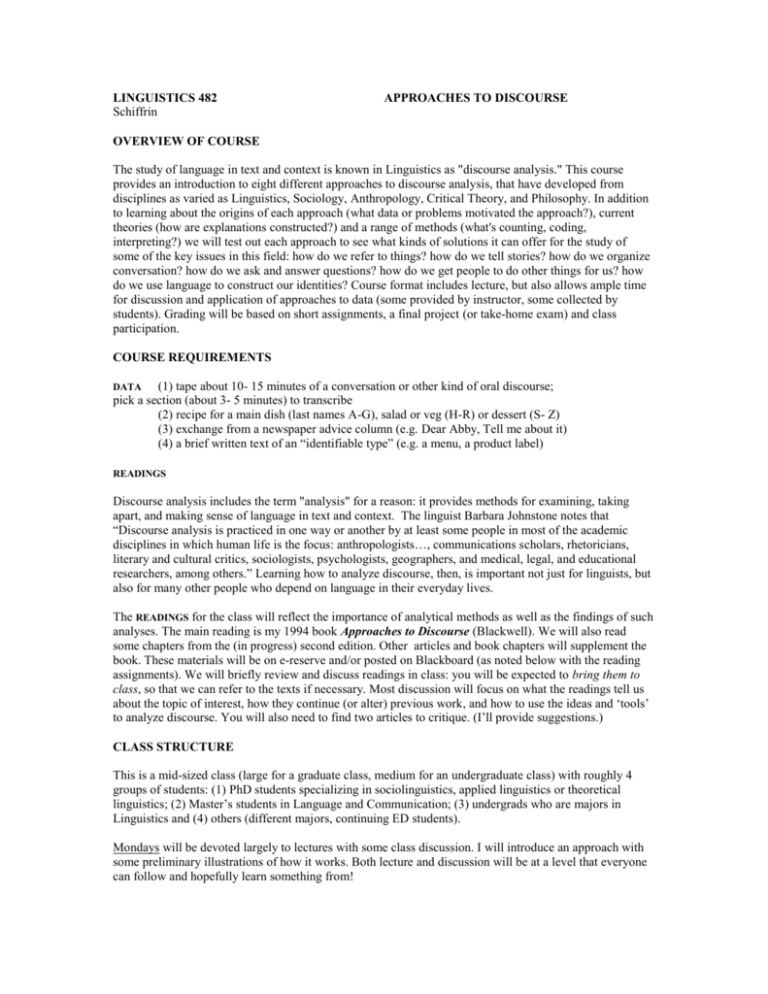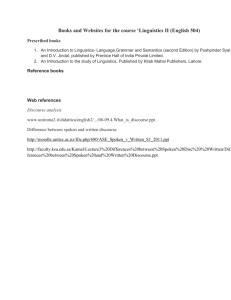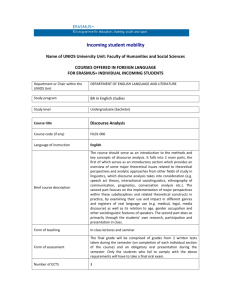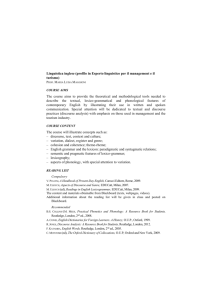LINGUISTICS 482
advertisement

LINGUISTICS 482 Schiffrin APPROACHES TO DISCOURSE OVERVIEW OF COURSE The study of language in text and context is known in Linguistics as "discourse analysis." This course provides an introduction to eight different approaches to discourse analysis, that have developed from disciplines as varied as Linguistics, Sociology, Anthropology, Critical Theory, and Philosophy. In addition to learning about the origins of each approach (what data or problems motivated the approach?), current theories (how are explanations constructed?) and a range of methods (what's counting, coding, interpreting?) we will test out each approach to see what kinds of solutions it can offer for the study of some of the key issues in this field: how do we refer to things? how do we tell stories? how do we organize conversation? how do we ask and answer questions? how do we get people to do other things for us? how do we use language to construct our identities? Course format includes lecture, but also allows ample time for discussion and application of approaches to data (some provided by instructor, some collected by students). Grading will be based on short assignments, a final project (or take-home exam) and class participation. COURSE REQUIREMENTS (1) tape about 10- 15 minutes of a conversation or other kind of oral discourse; pick a section (about 3- 5 minutes) to transcribe (2) recipe for a main dish (last names A-G), salad or veg (H-R) or dessert (S- Z) (3) exchange from a newspaper advice column (e.g. Dear Abby, Tell me about it) (4) a brief written text of an “identifiable type” (e.g. a menu, a product label) DATA READINGS Discourse analysis includes the term "analysis" for a reason: it provides methods for examining, taking apart, and making sense of language in text and context. The linguist Barbara Johnstone notes that “Discourse analysis is practiced in one way or another by at least some people in most of the academic disciplines in which human life is the focus: anthropologists…, communications scholars, rhetoricians, literary and cultural critics, sociologists, psychologists, geographers, and medical, legal, and educational researchers, among others.” Learning how to analyze discourse, then, is important not just for linguists, but also for many other people who depend on language in their everyday lives. The READINGS for the class will reflect the importance of analytical methods as well as the findings of such analyses. The main reading is my 1994 book Approaches to Discourse (Blackwell). We will also read some chapters from the (in progress) second edition. Other articles and book chapters will supplement the book. These materials will be on e-reserve and/or posted on Blackboard (as noted below with the reading assignments). We will briefly review and discuss readings in class: you will be expected to bring them to class, so that we can refer to the texts if necessary. Most discussion will focus on what the readings tell us about the topic of interest, how they continue (or alter) previous work, and how to use the ideas and ‘tools’ to analyze discourse. You will also need to find two articles to critique. (I’ll provide suggestions.) CLASS STRUCTURE This is a mid-sized class (large for a graduate class, medium for an undergraduate class) with roughly 4 groups of students: (1) PhD students specializing in sociolinguistics, applied linguistics or theoretical linguistics; (2) Master’s students in Language and Communication; (3) undergrads who are majors in Linguistics and (4) others (different majors, continuing ED students). Mondays will be devoted largely to lectures with some class discussion. I will introduce an approach with some preliminary illustrations of how it works. Both lecture and discussion will be at a level that everyone can follow and hopefully learn something from! Wednesdays will focus on using the tools learned through the readings and through Monday’s lectures. We will break up into smaller groups to work on exercises from the Chapters in Approaches and/or analyze data (either that I give out or data from the class corpus). It will be useful for you to work in class in two kinds of groups: one with your academic cohort (PhD together, MLC together, etc.) and the other across your levels. Each arrangement has advantages: with your peers, you share some common knowledge and can move on from that; with those from different levels, you can be challenged by those above and below your own level (on the latter, it’s often very hard to convey complex ideas in terms understandable to all…). I’ll put you into these groups. GRADING Grades are based on (1) transcription; (2) take-home exercises (to be chosen from 8 options throughout the semester, length 2-3 pp.); (3) brief ‘response’ paper to 2 research articles, length 2- 3 pp.); (4) final takehome exam (or independent project); (5) and class participation. Late assignments lose half of their points! Here is a breakdown of points per activity: Data (and transcript) Take-home exercises ‘Response’ to 2 extra articles* PhD, MLC Undergrad/other 5 points 10 points 50 pts (do 5; 10 pts. each) 44 pts (do 4, 11 pts. each) 10 pts (5 each) 10 pts (5 each) Take-home exam or project Class and “work group” participation 30 points 5 points 30 points 6 points *In (2-3) pages, you will report on the following: What was the problem addressed? What methods were used? What were the findings? What (if anything) would you do differently? What might you do next as a follow-up? SCHEDULE (tentative) Chapters from the current edition of Approaches will be noted as 94; those from the ‘in progress’ new edition will be noted as new. The location of other readings will also be noted. Occasionally I will note which readings are most pertinent to which students. INTRODUCTION, AUGUST 30 LANGUAGE, LINGUISTICS AND DISCOURSE September 6 Read -Chapter 1/new, “Language and Linguistics’ [Blackboard] -OPTIONAL READING, ESPECIALLY RECOMMENDED FOR PHD STUDENTS Chapter 2/94 Do tape a brief conversation; review Appendix 1 in Approaches/94 [Blackboard] WHY DISCOURSE? September 11 Read -Chapter 2/new “Language in text and context” [Blackboard] -Chapter 3/new “Discourse: Early data and analysis” [Blackboard] September 13 Do We will discuss transcription systems in class. Review Appendix 2 in Approaches/94 [on Blackboard]. Bring the following to class: - the section of the conversation (tape recorded) you’ve chosen to transcribe - 2 copies of your written data (recipe, advice column, other). I will collect one and assemble them for an in-class data packet OVERVIEW OF DIFFERENT APPROACHES September 18 Read -Approaches, Chapter 4/new “Different approaches to one example” [Blackboard] -Approaches, Chapter 5/new “Concepts, tools and comparisons” [Blackboard] September 20 Due Finish transcript, bring it to class; post on Blackboard (‘course documents’) PRAGMATICS September 25 Read -Approaches, Chapter 6/94 “Pragmatics” -Ochs Keenan, E. (1972) The universality of conversational postulates, Language in Society [e-reserve, Blackboard] OPTIONAL READING, ESPECIALLY RECOMMENDED FOR PHD STUDENTS -Schiffrin (2006) Chapter 4 “Reactive and proactive prototypes,” from In other words (Cambridge) [Blackboard, e-reserve] - Leech, G. (1983) Chapters 1-2, "Introduction" and "A set of postulates." Principles of Pragmatics. London: Longman. pp. 1-45. [e-reserve] September 27 -discuss application of Pragmatics to reference PRAGMATICS/SPEECH ACT THEORY October 2 Due Exercise 1, Pragmatics October 4 Read -Approaches, Chapter 3/94 “Speech act theory” OPTIONAL READING, ESPECIALLY RECOMMENDEDFOR PHD STUDENTS SPEECH ACT THEORY October 9 No school, Columbus Day October 11 Read OPTIONAL READING -Lakoff, R. (2001) “Nine ways of looking at apologies” In Schiffrin et. al. (Eds.) Handbook of Discourse Analysis, Blackwell. [e-reserve, Blackboard OPTIONAL, ESPECIALLY RECOMMENDEDFOR PHD STUDENTS Searle, John R. Speech Acts. Chapters 1-3, "Methods and Scope," "Expressions,Meaning and Speech Acts," "The Structure of Illocutionary Acts." pp. 3-71. [e-reserve] Due Exercise 2, Speech Act Theory NARRATIVE ANALYSIS/CONVERSATION ANALYSIS October 16 Read -Labov, W. (1972) The transformation of experience in narrative syntax. In Language in the Inner City. Philadelphia: U PA Press, 354–96. [e-reserve] - Mishler, E. (1995) Models of narrative analysis Journal of Narrative and Life Story [e-reserve] OPTIONAL READING - Narrative as self portrait: The sociolinguistic construction of identity. Lg in Society 25: 2 [ereserve] October 18 Read -Ochs, E. and L. Capps (2001), Chapter 1, Living Narrative (Harvard U Press) Chapter 1 [e-reserve] - Jefferson, G. (1978) Sequential aspects of storytelling in conversation. In J. Schenkein (ed.), Studies in the Organization of Conversational Interaction. New York: Free Press, 219–48. [e- reserve] Due Optional “response paper” on article on Narrative (TBA) or Exercise 3, Narrative CONVERSATION ANALYSIS October 23 Read - Approaches, Chapter 10/new “Conversation Analysis” OPTIONAL READING, ESPECIALLY RECOMMENDED FOR PHD STUDENTS -Approaches, Chapter 7/94 -Sacks, H., Schegloff, E. and Jefferson, G. (1974) A simplest systematics for the organization of turn-taking in conversation. Language, 50: 696–735. [e-reserve]; -Download and read one article from either Schegloff or Jefferson (http://www.sscnet.ucla.edu/soc/faculty/schegloff/pubs/index.php) http://www.liso.ucsb.edu/Jefferson October 25 Due Optional response paper on another CA article (TBA) or Exercise 4, Conversation Analysis INTERACTIONAL SOCIOLINGUISTICS October 30 Read - Approaches, Chapter 4/94 “Interactional Sociolinguistics” - Gumperz, J. (1982) . Chapter 2, "The Sociolinguistics of Interpersonal Communication." pp. 9-37. In Discourse Strategies (Cambridge U Press) - Tannen, D. "Oral and Literate Strategies in Spoken and Written Narratives." Language 58(1982):1-21. [e-reserve] November 1 Do Bring conversational data packet to class INTERACTIONAL SOCIOLINGUISTICS/VARIATION ANALYSIS November 6 Read -Approaches, Chapter 8/94 “Variation Analysis” Due Optional response paper on another Interactional Sociolinguistics article (TBA) or Exercise 5, Interactional Sociolinguistics November 8 -Schiffrin (1985) Multiple constraints on discourse options: A Quantitative analysis of causal sequences. Discourse Processes 8 (3), pp. 281-303 [e-reserve] OPTIONAL, ESPECIALLY RECOMMENDED FOR PHD STUDENTS -Schiffrin (2006) Chapter 1:Variation”; Chapter 5 “Referring sequences,” from In other words (Cambridge) [Blackboard] VARIATION ANALYSIS/ETHNOGRAPHY OF COMMUNICATION November 13 Due Exercise 6, Variation analysis Read -Chapter 12/new “Ethnography of Communication” [Blackboard, e-reserve] November 15 Read -Philips (1972), "Warm Springs 'Indian Time': How the Regulation of Participation Affects the Progression of Events." pp. 92-109. in Explorations in the Ethnography of Speaking [e-reserve] OPTIONAL, ESPECIALLY RECOMMENDED FOR PHD STUDENTS -Hymes “What is ethnography?” [e-reserve] ETHNOGRAPHY OF COMMUNICATION/CRITICAL DISCOURSE ANALYSIS November 20 Due Exercise 7, on Ethnography Read -Schiffrin (2005) “Discourse” in P. Trudgill and N. Dittmar (eds), Handbook of Sociolinguistics, (Mouton) [Blackboard] November 22 Read - van Dijk (2001) “Critical Discourse Analysis” In Schiffrin et. al. (Eds.) Handbook of Discourse Analysis, Blackwell [e-reserve] Pick one (or more) of the next three readings: 1. Wodak, R. and M. Reisigl (2001) Discourse and Racism in 2001 Handbook [e-reserve] 2. Fairclough, N. (1992) Chapter 3, “A social theory of discourse,” in Discourse and Social Change (Polity Press) [e-reserve] 3. abridged articles by Giddens, Bourdieu, Foucault [e-reserve] CRITICAL DISCOURSE ANALYSIS/COMPARISONS November 27 Due Optional response paper on another CDA article (TBA) or Exercise 8, CDA Read OPTIONAL Wodak, R. "Critical Discourse Analysis at the End of the 20th Century" (source TBA) [e-reserve] November 29 Read -Approaches, Chapters 9/94 “Structure and Function”, 10/94 “Text and Context”, 11/94 “ Discourse and Communication” Do Be ready to discuss possible final project (alternative to final take-home exam) CATCHING UP AND WRAPPING UP December 4 and 6 Read Approaches, Chapter 12/94 “Conclusion: Language as Social Interaction” Wodak, R. (2006) Dilemmas of discourse (analysis), Lg in Society, 35:4 [e-reserve] OPTIONAL, ESPECIALLY RECOMMENDED FOR GRADUATE STUDENTS Read something about one of the following areas: Mediated Discourse Analysis, Nexus Analysis, Rhetorical Structure Theory, Discourse Representation Theory, Corpus Linguistics Due If relevant, turn in abstract of final project








